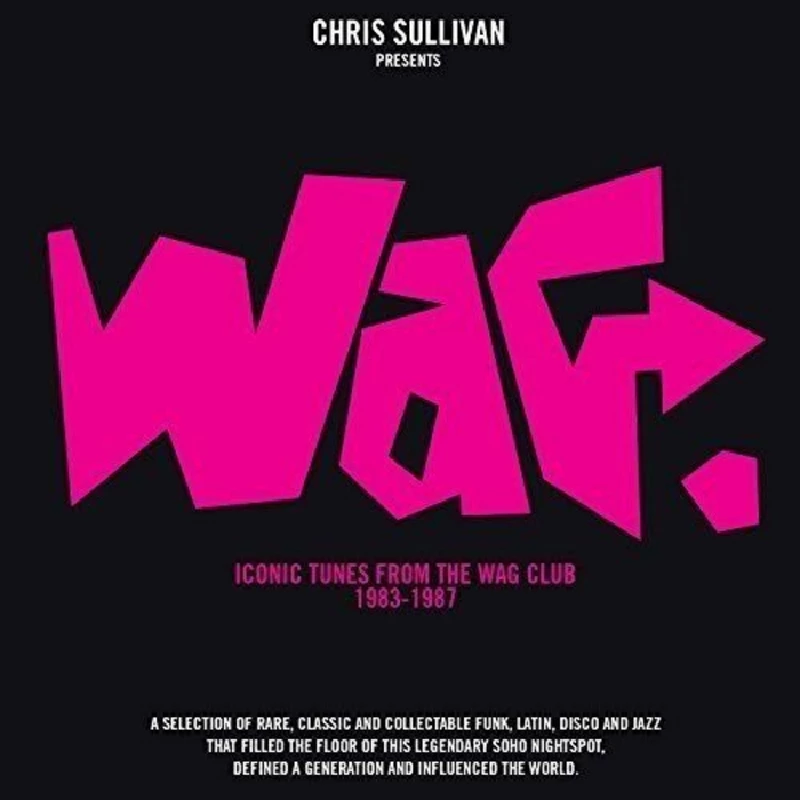Miscellaneous - Profile
by Mark Rowland
published: 21 / 7 / 2016

intro
While the original 80's club could be horrendously snobby, Mark Rowland finds that a new four CD Wag Club compilation BOX SET digs out some long forgotten gems
Number 35 Wardour Street, Soho, is pretty nondescript these days. An Irish-themed chain pub sandwiched between a betting shop and a 24-hour off-licence, it’s pretty easy to miss. But it hides a secret history: it was once one of the coolest and most exclusive clubs in London. The Wag opened in 1982, a refurbished and reinvigorated version of the Whiskey A Go-go, which had been hosting mod nights since the 60s. Its founder, Chris Sullivan, a motor-mouthed Welshman and one of the key players at the legendary new romantic club the Blitz, was sick of hearing the same old chart tunes in every club he went to. "At the time, all the West End clubs were playing shit pop music, so I wanted to open somewhere for me and people like me,” he said back in 2001. “A cool club with a great mix of music, whether it be jazz or funk or disco or reggae, a different vibe every night." The Wag’s playlist was decidedly retro, at least in its early days – the club hosted a different night each week, and deliberately cultivated a core cabal of regulars with its strict door policy. It was a key proponent of the jazz revival in the 80s that gave rise to acts such as Sade, though the club and its regulars were quick to distance itself from the poppier aspects of that revival, preferring to focus on the ‘authenticity’ of records from the 40s, 50s and 60s. ‘Chris Sullivan Presents the Wag: Iconic Tunes from the Wag Club 1983-1987 ’ focuses on those early years, before the club refocused on acid house and played a key role in breaking hip hop in the UK. Its four discs focus on four genres: funk, disco, Latin and jazz. Disc one is firmly in the funk camp, featuring some stone cold 70's classics such as Aaron Neville’s ‘Hercules’ and Gil Scott Heron’s ‘17th Street’, plus more obscure cuts such as Doris Duke’s ‘Woman of the Ghetto’. Things are a little more mixed on other discs, as Sullivan gradually adds disco, jazz, Latin and some early electronic dance. While big names such as James Brown and Earth, Wind and Fire make their presence felt, the real joy of this disc is the relative unknowns, such as the driving groove of Miami’s ‘Kill that Roach’. The grooves get longer and the pace gets faster on disc two, with tracks such as ‘K-Jee’ by the Night Lighters and the Fatback Band’s ‘(Do The) Spanish Hustle’ sitting somewhere between Latin and disco. It’s all incredibly danceable, and Sullivan avoids going for the obvious in any genre – that’s not what the Wag was about. Disc three opens with an instrumental jazz cover of Curtis Mayfield’s ‘Freddie’s Dead’. This sets the pace for the rest of the disc, a collection of fusion tracks and Latin takes on jazz standards such as ‘A Night in Tunisia’. It’s refreshing to hear familiar tracks completely transformed by lesser known Latin and jazz musicians, and Sullivan has dug out some greats, such as hard bop and be bop trumpeter Freddie Hubbard, who are often overshadowed by the bigger names they played with (in Hubbard’s case, Ornette Coleman and John Coltrane). Things get more electronic on the final disc, with dance pioneer Arthur Russell’s avant disco moniker Dinosaur L making an appearance with ‘Go Bang’. Again Sullivan avoids the obvious – early hip hop is represented by Junkyard Band, rather than Grandmaster Flash or Afrika Bambaataa (both of which played at the Wag). Digital Underground’s classic ‘The Humpty Dance’ also makes an appearance (which, as it came out in 1989, shouldn’t be on here, but who cares – it’s great). For the regulars and stars that frequented it, the Wag was the best night out in London. For many others, it’s snobbery and elitism represented the 80s at its worst. Away from the trappings of the original club, however, you’re left with a compilation largely made up of obscure and semi-obscure tracks that span four decades. The funk stuff alone is worth a look.
most viewed articles
current edition
Spear Of Destiny - InterviewRobert Forster - Interview
Fiona Hutchings - Interview
When Rivers Meet - Waterfront, Norwich, 29/5/2025
Carl Ewens - David Bowie 1964 to 1982 On Track: Every Album, Every Song
Brian Wilson - Ten Songs That Made Me Love...
Chris Wade - Interview
Shrag - Huw Stephens Session 08.12.10 and Marc Riley Session 21.03.12
Pistol Daisys - Waterfront, Norwich, 29/5/2025
Credits - ARC, Liverpool, 17/5.2025
previous editions
Heavenly - P.U.N.K. Girl EPBoomtown Rats - Ten Songs That Made Me Love....
Barrie Barlow - Interview
Oasis - Oasis, Earl's Court, London, 1995
Manic Street Preachers - (Gig of a Lifetime) Millennium Stadium, Cardiff, December 1999
Dwina Gibb - Interview
Chuck Prophet - Ten Songs That Made Me Love...
Pixies - Ten Songs That Made Me Love...
David Paton - Magic: The David Paton Story
Sound - Interview with Bi Marshall Part 1
most viewed reviews
current edition
Peter Doolan - I Am a Tree Rooted to the Spot and a Snake Moves Around Me,in a CircleGarbage - Let All That We Imagine Be The Light
Vinny Peculiar - Things Too Long Left Unsaid
Little Simz - Lotus
John McKay - Sixes and #Sevens
Suzanne Vega - Flying With Angels
HAIM - I Quit
Morcheeba - Escape The Chaos
Vultures - Liz Kershaw Session 16.06.88
Billy Nomates - Metalhorse
Pennyblackmusic Regular Contributors
Adrian Janes
Amanda J. Window
Andrew Twambley
Anthony Dhanendran
Benjamin Howarth
Cila Warncke
Daniel Cressey
Darren Aston
Dastardly
Dave Goodwin
Denzil Watson
Dominic B. Simpson
Eoghan Lyng
Fiona Hutchings
Harry Sherriff
Helen Tipping
Jamie Rowland
John Clarkson
Julie Cruickshank
Kimberly Bright
Lisa Torem
Maarten Schiethart